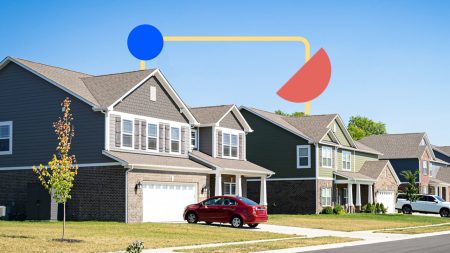Images by GettyImages; Illustration by Hunter Newton/Bankrate
No matter what state you’re in, real estate transactions are financially complex. Homebuyers and sellers have to think about more than just the home’s sale price: Closing costs are the fees and taxes that must be paid in order to finalize a real estate deal. Both buyers and sellers need to be prepared to cover some of these closing costs.
In California, one of the most expensive places in the country to live, closing costs are no bargain. Golden State residents pay some of the highest closing costs in the nation, according to data from CoreLogic’s ClosingCorp. If you’re considering buying or selling here, read on for more details about closing costs in California, and who pays for what.
How much are closing costs in California?
Closing costs vary widely from one state to the next. In California, excluding Realtor’s fees, these costs amount to about 1 percent of a home’s sale price, per ClosingCorp. While that’s not a particularly high percentage, the state’s housing prices are exceptionally high. The median home sale price statewide was a super-steep $886,560 in July 2024, according to the California Association of Realtors — that’s more than double the nationwide median, and it puts closing costs at about $8,865.
The final tab for closing costs, however, can vary significantly depending on which part of California a property is located in. For instance, in the pricey San Francisco Bay Area, the median sale price was $1.3 million, which means closing costs would be $13,000. But in the Central Valley region, which includes the state capital of Sacramento, the median was a much lower $500,000, putting closing costs at $5,000.
Who pays closing costs in California, buyers or sellers?
Both buyers and sellers pay closing costs in some form or another. Here’s a breakdown of what each party in the transaction is most often responsible for paying — and don’t forget that if you choose to hire a real estate attorney, the legal fees will be due at closing as well.
Common closing costs for buyers
- Loan-related fees: Most lenders charge an origination fee for establishing your loan, and may charge application and credit-check fees as well. As you shop around for a California mortgage, pay attention to these — they may vary significantly from one lender to the next.
- Home appraisal: Mortgage lenders also require home appraisals to ensure a home is worth what they’re loaning you. The cost of an appraisal is typically around $300 or $400.
- Home inspection: The cost of an inspection will likely be another $300 or $400. This one is not mandatory, but most buyers will want a professional to examine the home and determine whether it has any major damage or problems. If an issue is flagged, you may be able to use it as leverage in your negotiations.
- Title-related fees: A title search involves reviewing property records to confirm that there aren’t any liens or encumbrances on the home’s title. Title insurance is designed to protect you should someone else have any claims on the home.
- Mortgage points: Paying to lower the interest rate on your mortgage can be tempting in a high-interest rate environment. This optional step will drive up your closing costs, but can save you money over the life of your mortgage.
- Property taxes and insurance premiums: Buyers might be required to prepay a certain amount of property taxes and homeowners insurance premiums. The funds are typically held in escrow and paid out as needed.
Common closing costs for sellers
- Realtor commissions: Real estate agent commissions are often the biggest expense for home sellers. Each agent typically earns between 2.5 and 3 percent of the home’s sale price — for a median-priced California home of $886,560, 2.5 percent comes to more than $22,000. If you’re responsible for paying your buyer’s agent’s fee as well (each deal will be different), expect to pay double that.
- Transfer tax: Real estate transfer taxes cover transferring ownership of the property. In most Golden State counties they run $1.10 for every $1,000 in home value. There may be a modest recording fee of a couple hundred dollars as well.
- Title insurance: Title insurance provides protection in the event that issues arise with the title on your property, and typically covers legal costs if mistakes are discovered. It can cost anywhere from a few hundred dollars to as much as $1,000.
- Property taxes and HOA fees: Your property taxes and HOA dues (if applicable) must be up-to-date up until the day you close.
- Mortgage payoff: If you still have a mortgage on the home you’re selling, that will have to be paid off, typically by transferring funds from your sale proceeds. Your bank will likely charge a nominal wire transfer fee.
Lowering your closing costs in California
Like just about everything else in a real estate deal, you can negotiate some closing costs to help lower what you owe. Sellers will usually have more leverage in sellers’ markets, though, and vice versa.
Sellers should keep in mind that agents’ commission fees are often negotiable. On high-priced homes like those in California, a small commission discount can save you thousands of dollars.
If you’re buying a home in California, see if you’re eligible for any government-sponsored assistance programs. There are often federal, state and even city-level programs available to help cover some or all of your closing costs, especially if you’re a first-time homebuyer. It can also pay to shop around for mortgage lenders and other service providers that offer the lowest rates.
Find a local real estate agent
Regardless of whether you’re buying or selling a home, navigating the complexities of a real estate transaction can be far easier with a professional at your side. When looking for an agent, a good place to start is to ask friends and relatives who have had a positive experience with their own Realtor. It’s also a good idea to examine an agent’s online presence, including reading any reviews you can find from previous clients. And don’t discount good old-fashioned legwork — drive or walk around the neighborhoods you’re interested in and note the names on “for sale” or “sold” signs, especially on homes you like or homes similar to yours.
FAQs
-
In all states, including California, both the buyer and the seller are responsible for a portion of the closing costs in a real estate transaction. Typically, buyers’ costs are more focused around the mortgage loan, and sellers’ costs often include real estate commissions and transfer taxes.
-
Average closing costs in California are about 1 percent of a home’s sale price, according to data from ClosingCorp. For a $500,000 home, that would amount to around $5,000. These costs are split between the buyer and the seller, though, so one party would not be responsible for the full amount.
Read the full article here










